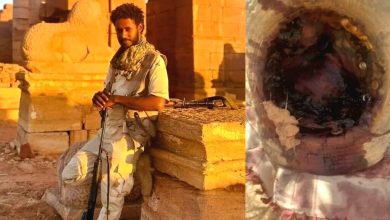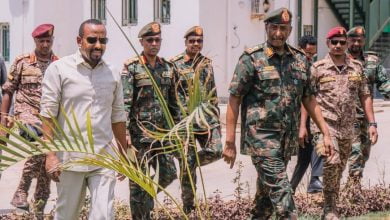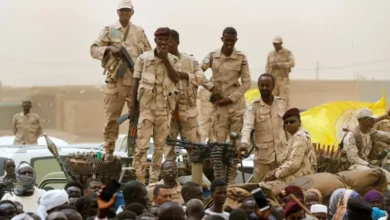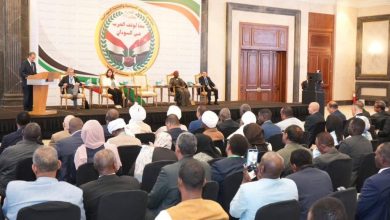Al Burhan in Cairo In Response to the Refugees’ Complains:
Experts to AlMuhagig: Egypt’s Position Towards the Sudan Crisis is Firm; Cairo can Separate Diplomatic Files

Cairo – AlMuhagig: Sabah Musa
The visit of the Chairman of the Sovereignty Council of Sudan, General Abdel Fattah Al-Burhan, to Cairo yesterday has garnered significant attention at all local, regional, and international levels. This is due to the unique relationship between the two countries and its great importance to Egypt’s stance regarding developments in Sudan.
The timing of the visit is crucial, reflecting more significant implications for the overall situation in Sudan and the region. It also indicates Egypt’s steadfast position on the crisis in Sudan, as affirmed in the outcomes of the meeting between Al-Burhan and President Sisi, during which the Egyptian President reiterated Egypt’s unwavering and complete support for the security, political, and economic stability in Sudan.
Unique Relationships
The official spokesman for the Egyptian Presidency, advisor Ahmed Fahmy, stated after the meeting that President Sisi emphasized the uniqueness of the historical fraternal relations between Egypt and Sudan, emphasizing Egypt’s keenness to enhance bilateral cooperation for the benefit of both peoples. The meeting also reviewed developments in Sudan and efforts to resolve the ongoing crisis to ensure the restoration of stability, preserve the sovereignty, unity, and cohesion of the Sudanese state and its institutions, and meet the aspirations of the Sudanese people towards achieving security and stability.
The official spokesman for the Egyptian Presidency added that General Burhan expressed Sudan’s great appreciation for Egyptian support amid the country’s current circumstances. He pointed out that this support reflects the longstanding ties between the two sisterly countries, which have been reflected in Egypt’s role in receiving Sudanese citizens and alleviating the effects of the crisis. The meeting also addressed the latest developments in regional issues of mutual interest, including the situation in Gaza, where the necessity of an immediate ceasefire and the implementation of humanitarian aid was emphasized. It was also agreed to continue intensive consultation and mutual coordination during the upcoming period for the common interest of both countries and peoples.
Facilitating Procedures
At the same time, President Sisi affirmed the commitment of the Egyptian authorities to treat Sudanese residents the same way they treat their Egyptian brothers in education, healthcare, and facilitating residency procedures. President Sisi directed the relevant authorities in Egypt to facilitate and expedite all procedures related to the Sudanese brothers.
A Steadfast Position
Al-Burhan’s visit to Cairo comes at a crucial time. Despite its short duration, which lasted only a few hours, it came as a clear response to anyone who doubted Cairo’s steadfast position towards Khartoum. It also responded to all those who doubted Egypt’s adherence to its firm stance on the Sudanese crisis, affirming its standing alongside the Sudanese people, its stability, and the integrity of its territories. Additionally, the urgent directive by President Sisi to treat Sudanese residents in Egypt as Egyptians, even if this directive helps, at the very least, facilitate the entry of Sudanese into Egypt and streamline residency procedures, the visit will have achieved significant success in alleviating the burdens on the Sudanese people, who have been displaced by war.
For further analysis of the outcomes of the visit, we discuss in this report the importance, timing, implications, and responses to doubts.
Separating Files
The journalist Khaled Mohamed Ali, Deputy Editor-in-Chief of Al-Usbu’ newspaper and an expert on Sudanese affairs, believes that Al-Burhan’s visit to Cairo came after two important visits: his visit to Tripoli and Aqila Saleh’s visit to Cairo. Ali told “Al-Muhagig” that the visit certainly touched upon transforming the area between Egypt, Sudan, and Libya into a region for reconstruction and investment instead of smuggling humans and weapons.
He emphasized the need to unify visions to transform this dangerous area into an economic zone, especially since it is rich in minerals and abundant resources that can benefit the region’s countries economically.
He noted that Egypt has recently started discussing post-war Sudan and preparing for a comprehensive national dialogue that includes everyone. He said indications of the Sudanese army’s victories on the ground and its initiative have become significantly clear, supporting the idea of thinking about post-war Sudan and a comprehensive national dialogue.
He further explained that there is a shared vision between the two countries after the army’s victory, in which Libya and Eritrea also participate. He clarified that President Sisi’s directive to treat Sudanese residents in Egypt as Egyptians will be strictly implemented. Ali did not rule out the possibility of applying some form of facilitation regarding the residency of Sudanese in Egypt and extending their residency period. He attributed the complexity of Egyptian procedures for Sudanese after the war to the infiltration of rogue elements into Egypt and that Egyptian authorities were trying to verify the crossing process, which complicated matters.
He affirmed that Egypt follows a policy of compartmentalization in files, citing the Turkish-Egyptian dispute in Libya as an example, at a time when other files between the two countries match in vision. He added that this steadfast Egyptian stance extends to Egyptian-Emirati relations, as there may be interests between Cairo and Abu Dhabi, but this cannot affect Egypt’s steadfast position towards Sudan, its legitimacy, the preservation of its institutions, and non-interference in its internal affairs.
The Strongest Supporter
Othman Mirghani, the editor-in-chief of Al-Tayyar newspaper, affirmed that Al-Burhan’s visit to Cairo came at a crucial time for Sudan. It touched upon three military, diplomatic, and economic aspects. He told “Al-Muhagig” that the most important thing about the visit was the peace negotiations and that Egypt was the strongest and primary supporter on regional and international levels. He added that Egypt had previously launched the initiative of Sudan’s neighbouring countries after attempts of military intervention in Sudan by the IGAD initiative, confirming that Egypt’s position is consistent with what was agreed upon in the Jeddah platform, which is “the withdrawal of the Rapid Support Forces from Khartoum and Al-Jazeera states and the integration of the Rapid Support Forces into the Sudanese army.” Mirghani also mentioned that the treatment of Sudanese in Egypt was “to some extent” exceptional treatment before and after the war, with the large influx of Sudanese to its territories, noting complaints about residency procedures. He expected President Sisi’s directives to impact residency procedures and their extension. He affirmed that the Sudanese crisis is not a passing issue in Egypt, saying that Sudan in Egypt is a national security matter and that Cairo’s position has been consistent since the beginning of the war by not interfering in Sudan’s internal affairs. He said that reaffirming this position is not up for negotiation.
Removing Obstacles
Salah Halima, Deputy Chairman of the Egyptian Council for African Affairs, agreed that the visit is of great importance given the circumstances in Sudan. He said to “Al-Muhakik” that the visit came after the army’s victories in several areas, which may spread to other regions. It also came after Al-Burhan visited Libya, which sought to create an understanding in Sudan, while at the same time, he did not expect Libya to succeed in that. Ambassador Halima added that the developments in the Red Sea and the aggression on Gaza imposed themselves on the Presidents’ discussions, as well as emphasizing the defense of the Red Sea’s security. He confirmed Egypt’s consistent position of not intervening in Sudan’s internal affairs, which is not negotiable. He added that there is clear support from the army and the people in Sudan for overcoming the crisis through a comprehensive national dialogue. He noted that President Sisi’s directive regarding the treatment of Sudanese in Egypt has been present since the beginning of the crisis, saying, “I believe that there might be some obstacles resolved, especially residency procedures.” Regarding the crisis settlement, Halima pointed out that the current trend is towards activating the Jeddah initiative, saying that the initiative of Sudan’s neighbouring countries is also strong and can make a breakthrough in the Sudanese crisis. He confirmed that Egypt is the most keen on the security and stability of Sudan and the integrity of its territories, saying that any adverse effects in Sudan will reflect on Egypt’s national security.





